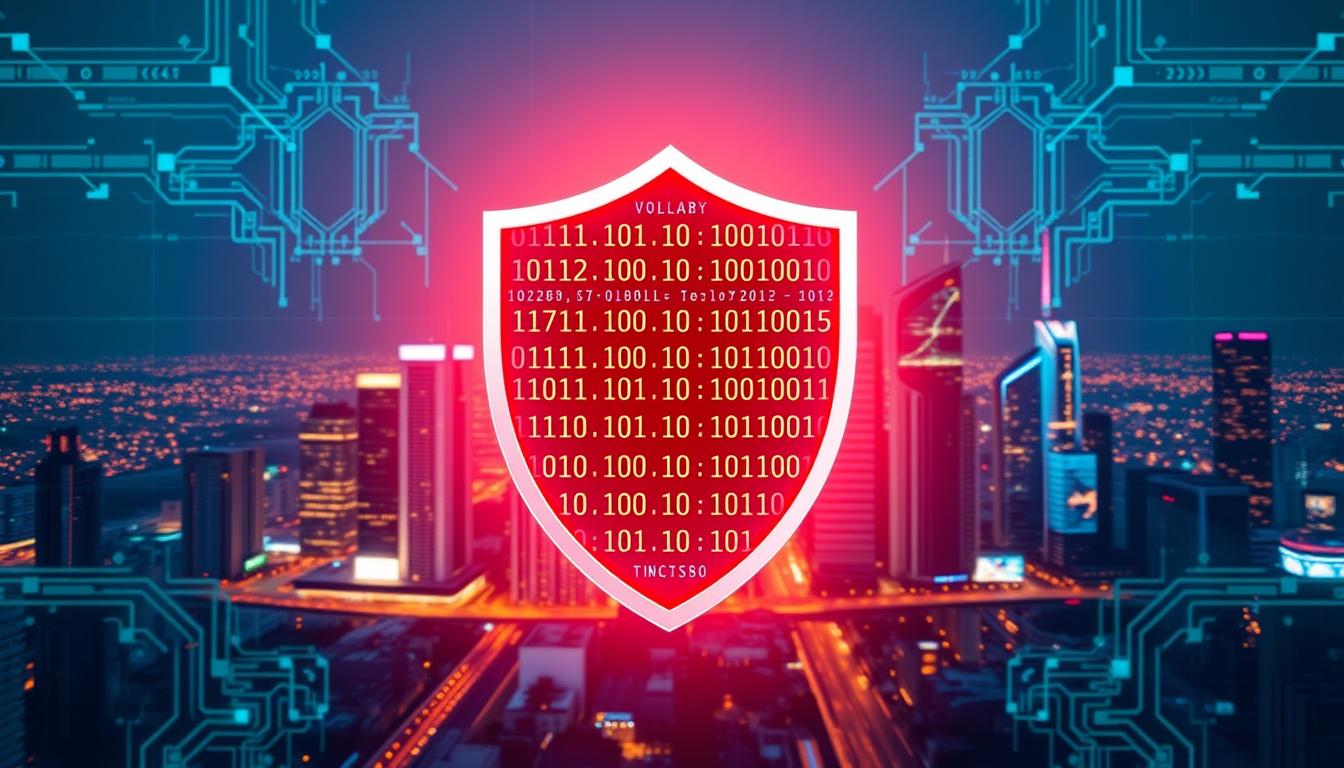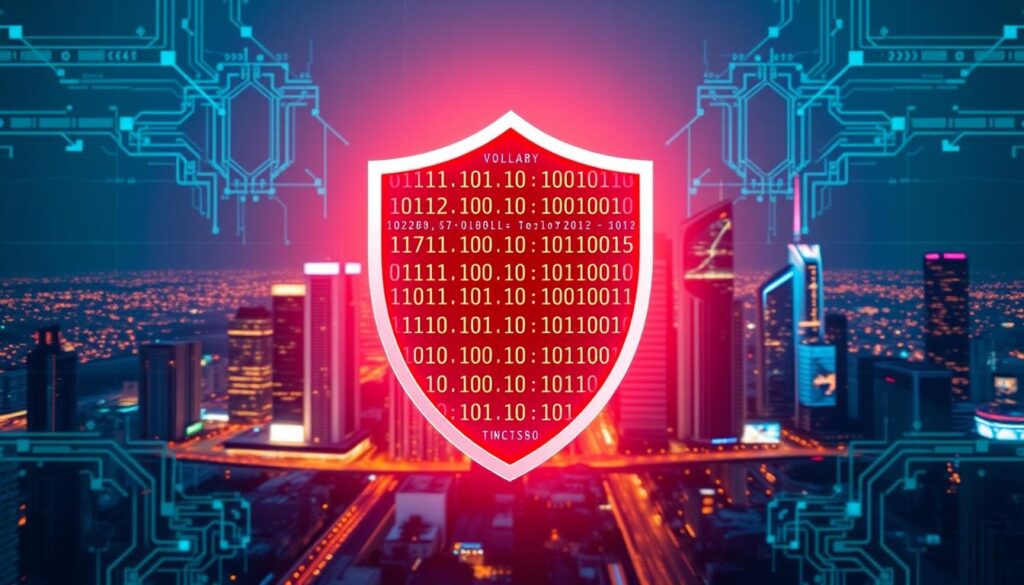Why Cybersecurity is Needed: Protecting Digital Lives

Why Cybersecurity is Needed: Protecting Digital Lives
Our digital lives are now a big part of our everyday lives at home and work. With the rise of technology, we need strong cybersecurity more than ever. The digital world has brought new risks, making our personal and work data vulnerable to cyber threats.
Imagine you could protect your online life from cyber attacks. How do you keep your personal and financial info safe from hackers? These questions show why cybersecurity is key for everyone in the digital world.
Key Takeaways
- The digital landscape has expanded rapidly, creating new cyber vulnerabilities
- Cyber threats are a growing concern, with data breaches and attacks on critical infrastructure
- Effective cybersecurity measures are crucial to protecting sensitive information and ensuring online privacy
- Risk management strategies are essential to mitigate the impact of cyber attacks
- Regulatory compliance and a focus on cyber resilience are necessary for long-term digital security
The Expanding Digital Landscape
Today, digital technologies are changing how we live and work. We can now connect and share information in ways we couldn’t before. This change brings many benefits but also new risks that need strong cybersecurity.
Embracing the Technological Revolution
Cloud computing, social media, IoT, and mobile devices have changed our world. They make us more productive and connect us globally. But we must also focus on keeping our digital lives safe.

Increasing Cyber Vulnerabilities
As technology grows, so do the risks. Hackers and cybercriminals aim to exploit our digital systems. That’s why cybersecurity is critical to protecting our online world and keeping us safe.
The five reasons why cybersecurity is essential now more than ever are:
- Safeguarding personal and sensitive data
- Protecting critical infrastructure from cyber attacks
- Preventing financial losses due to cybercrime
- Ensuring business continuity and reputation
- Complying with evolving data privacy regulations
Choosing a career in cybersecurity lets you help solve these issues and secure our digital future.
Cyber Threats: A Growing Concern
Cyber attacks are a big worry in our digital world. Cybercriminals and nation-state actors keep finding new ways to break into our digital spaces. They threaten us with malware, ransomware, phishing attacks, and data breaches.
It’s vital to understand the five important aspects of cyber security and the ten reasons why it’s crucial. Cybercriminals are getting better at what they do, and they have more money and tech skills. So, we all need to protect ourselves.
Malware can steal our data, and ransomware demands money to unlock our files. Phishing attacks trick people into giving away their login details or downloading lousy software.
These threats can cause massive problems, like financial losses and damage to our reputation. They can even stop critical services from working. With more of our lives online, we need more robust cyber security than ever.
Everyone, businesses and individuals must be careful. We need to take vital security steps, like good access controls and encryption. Regular software updates and employee training are also crucial. By being proactive, we can fight off cyber threats and keep our digital lives safe.
Read More: Exploring the Various Types of Cyber Security Threats
Data Breaches: Protecting Sensitive Information
In today’s digital world, keeping our data safe is crucial. Data breaches are a significant threat, affecting both individuals and companies. Students, workers, and businesses must understand the risks of losing personal or company data. This loss can lead to identity theft, financial harm, and damage to reputation.
The Consequences of Data Breaches
Data breaches can cause big problems. For example, identity theft can lead to fake credit card charges and stolen personal info. This can also cause significant financial losses. Companies and people might have to spend a lot to fix things and could face legal issues.
Implementing Strong Data Security Measures
- Encryption: Ensuring sensitive data is encrypted helps protect it from unauthorized access.
- Access controls: Strong access controls, like multi-factor authentication, keep unauthorized people out.
- Incident response plans: Having and testing these plans helps companies deal with data breaches quickly and satisfactorily.
By taking these cyber security steps, we can protect ourselves from the adverse effects of data breaches. Cyber security is essential for everyone in today’s digital world.
Read More: Different Types of Cyber Security: A Comprehensive Guide
Network Security: Safeguarding Critical Infrastructure
Robust network security is critical in our digital world. Cybersecurity tools like firewalls and secure communication protocols protect our digital world and society from cyber threats that could harm our daily lives.
Read More: What is Network Security? Definition, Importance, and Types
Securing Corporate Networks
Corporate networks are vital for businesses, as they hold sensitive data and run daily operations. Keeping these networks safe is critical in fighting the three importance of cyber security. With solid security, companies can protect their data, keep operations going, and keep employee and customer info private.
Protecting Critical National Infrastructure
The importance of cyber security in points goes beyond companies. Cyber attacks threaten power grids, transport systems, and communication networks. Keeping these systems safe is crucial for our national security and community safety.
Cybersecurity tools are vital in protecting these critical systems. They stop attacks that could significantly affect our lives. By fixing weaknesses and using strong security, we strengthen our infrastructure and keep it running smoothly.
Why Cybersecurity is Needed
In today’s world, cybersecurity is a big deal for everyone. With new tech constantly coming out, we need strong cyber security to keep our online lives safe. This includes protecting our personal information and keeping our digital world secure.
Cybersecurity is critical for a few main reasons:
- Protecting sensitive data: Hackers always want to access our personal and financial information. We need strong security to keep this information safe and prevent data breaches.
- Securing critical infrastructure: Power grids and healthcare networks depend significantly on the Internet. Cybersecurity keeps these critical systems safe and working correctly.
- Mitigating the growing threat of cyber attacks: Cyber threats like malware and hacking are getting more common and tricky. We need good cybersecurity to fight these threats.
- Maintaining trust and confidence in digital systems: We use technology for more and more things every day. Cybersecurity keeps us trusting and confident in these digital tools and services.
Knowing how vital cybersecurity is and using decisive security steps helps keep our online lives safe. It also helps protect our info and keeps our digital world stable and secure.
Risk Management: Mitigating Cyber Risks
Effective risk management is critical in cybersecurity. It helps identify and tackle cyber threats, keeping data and infrastructure safe. This article outlines the ten reasons why cybersecurity is needed.
Identifying and Assessing Cyber Risks
The first step is to check the organization’s cyber risks. This means:
- Conducting thorough risk assessments to find vulnerabilities and possible attack paths
- Looking at the impact and chance of different cyber threats, like data breaches and network intrusions
- Keeping up with the latest in cybersecurity trends and threats
Understanding cyber risks helps leaders choose what to focus on.
Developing Comprehensive Risk Management Strategies
After identifying and assessing risks, it’s time to make a robust risk management plan. This plan might include the following:
- Using strong security measures, like firewalls and encryption
- Having plans for responding to and recovering from cyber attacks
- Building a culture that values cybersecurity awareness and trains employees
- Regularly checking and updating the risk management plan to keep up with new threats
Organizations can protect against cyber threats and protect their digital assets by being proactive and comprehensive.
Cyber Resilience: Bouncing Back from Attacks
In today’s digital world, cyber threats are more common and complex. Companies need to focus on malware prevention, privacy, and following rules. But, when cyber attacks happen, being able to bounce back is critical.
Being cyber resilient means handling, reacting to, and overcoming security issues. This lets companies continue running smoothly after a cyber attack. It’s about using different strategies and best practices to lessen the blow of cyber threats and keep business going.
- Robust Incident Response Planning involves creating a detailed plan for responding to a cyber attack. This plan should include finding and stopping the attack and then getting back on track.
- Backup and Disaster Recovery: Strong backup systems and plans to quickly return essential data and systems after a breach or failure.
- Employee Awareness and Training: Teach employees about cybersecurity best practices. This will help them spot and report suspicious activities, making the company safer.
- Continuous Monitoring and Threat Intelligence: Using advanced tools and intelligence to find and deal with threats quickly. This helps stop malware before it’s too late.
- Collaborating with Cybersecurity Experts: Collaborating with cybersecurity pros and groups to keep up with the latest security news, rules, and practices helps you stay compliant and keep data safe.
By following cyber resilience, companies can better handle, react to, and recover from cyberattacks. This reduces the effect on their work and protects their essential data and assets. This all-around approach to cybersecurity is crucial in our fast-changing digital world.
Privacy Concerns in the Digital Age
Our lives are increasingly influenced by digital technology, making privacy protection key. Cybersecurity tools like data encryption and privacy tech are vital. They keep our personal information safe and protect our online privacy.
Protecting Personal Information
With lots of data collection, we must watch over our personal info. This includes bank details, health records, and social media posts. Strong passwords, two-factor authentication, and updating software help prevent data theft and identity fraud.
Ensuring Online Privacy
Social media, online shopping, and cloud services have increased our digital presence. Keeping our online privacy means using secure communication methods and being careful with what we share online. Using privacy-focused tools helps us fight cybercrime and keep our info safe.
- Cybersecurity critical in protecting personal information
- Importance of data encryption and access controls
- Strategies for ensuring online privacy in the Digital Age
- Minimizing the risk of cybercrime and data breaches
Regulatory Compliance and Cybersecurity
In our digital world, governments and regulatory bodies have set rules to help protect organizations. These rules prevent hacking, keep data private, and secure systems. Following these rules is critical to keeping customers, partners, and stakeholders trusting us as cybercrime and data privacy issues grow.
Rules like the GDPR, HIPAA, and PCI DSS require organizations to have strong plans to protect sensitive information. Not following these rules can lead to big fines, damage to reputation, and loss of customer trust.
Organizations need a full plan to meet these rules and improve cybersecurity. This plan should include training employees, conducting regular risk checks, and using the latest security tech. By tackling potential risks and following best practices, companies can keep their data safe and be seen as trustworthy online.
The need to follow rules and keep up with cybersecurity will continue to grow. By staying updated, investing in strong security, and promoting a culture of security awareness, organizations can handle the digital era’s challenges and protect their valuable assets from cybercrime threats.
Conclusion
In today’s digital world, cybersecurity is more important than ever. We must understand the threat of cyber attacks and the need for solid security. This helps us protect our digital lives and keep our society safe.
Protecting our data and infrastructure is critical. Cybersecurity affects every part of our lives. By being alert, using strong security tools, and promoting cyber resilience, we can fight against threats, making the Internet a safe place for everyone.
As technology improves, we’ll need better cybersecurity. By tackling this challenge and focusing on security, we can fully use technology. This protects our data, privacy, and digital future.
FAQ
What is the importance of cybersecurity?
Cybersecurity protects our digital lives and keeps our data safe. It also secures essential infrastructure and fights cyber threats, keeping our digital world stable and prosperous.
Why do we need cybersecurity more than ever?
Our use of digital tech has grown fast, making us more vulnerable to cyber threats. Things like malware and data breaches are happening every day now. We need strong cybersecurity to protect our info and networks.
What are the benefits of choosing a career in cybersecurity?
A career in cybersecurity is secure and pays well. It lets you protect our digital world. It’s a growing field with many job options, from network security to risk management.
What are the five key reasons why cybersecurity is essential?
Cybersecurity is critical for five main reasons. It protects our data and keeps our infrastructure safe. It fights cyber threats, follows laws, and boosts digital security and resilience.
Why is cybersecurity critical for students?
Students need cybersecurity to stay safe online in school and at home. It protects their online identity and information and prepares them for a career in a growing field.
What are the three main reasons why cybersecurity is essential?
Cybersecurity is vital for three main reasons. It protects our data, secures our systems, and fights cyber threats. This keeps organizations resilient.
Can you provide some examples of cybersecurity in action?
Cybersecurity uses many tools and practices. Firewalls, encryption, and training help protect against threats like malware and hacking. These steps keep our digital assets safe.
What are the different types of cybersecurity?
Cybersecurity covers many areas. Network, application, cloud, endpoint, and identity security are some. Together, they protect our digital assets from threats.
Why is cybersecurity so critical, and what are the ten key reasons for its necessity?
Cybersecurity is vital for our digital safety. It protects our info, secures our infrastructure, and fights cyber threats. It also ensures laws are followed, builds trust, and more.
Can you explain the importance of cybersecurity in an essay format?
Cybersecurity is crucial in the digital age. As our tech use has grown, new risks have emerged. Strong cybersecurity is needed to protect us from cyber threats.
What is the role of cybersecurity in malware prevention and privacy protection?
Cybersecurity is critical in fighting malware and protecting privacy. It uses tools like antivirus and encryption to keep our info safe. These steps are vital for online privacy.
How do cybersecurity and compliance regulations work together?
Laws and standards ensure cybersecurity is a priority. Meeting these rules builds trust with customers and partners. Cybersecurity steps like encryption help organizations follow these rules and protect their data.


